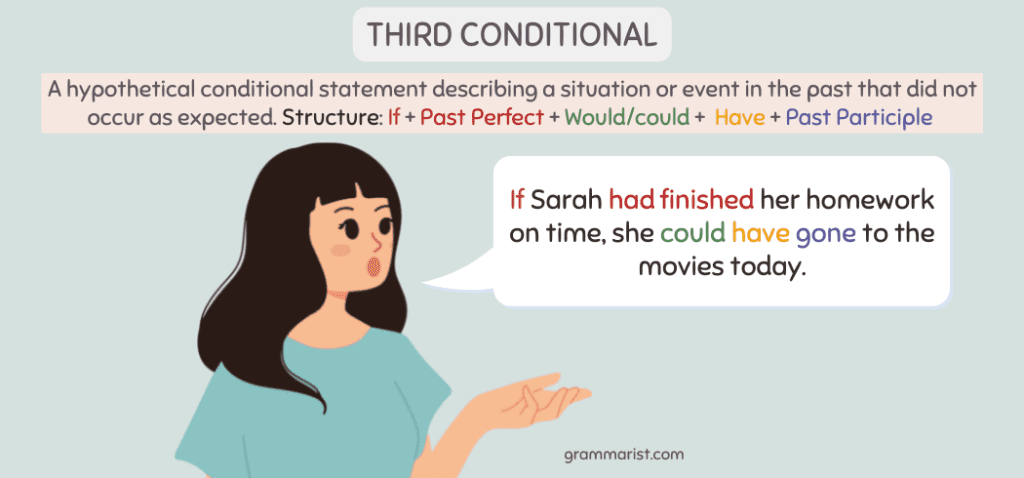There are four different conditional sentence structures in the English language. They explain the tense of events that could have or might have occurred or will occur if specific conditions are met.
The third conditional sentence tense use deals with events in the past that did not occur. Let’s review this and then practice its usage using the three types of exercises I provided for you.
Third Conditional Sentences Explained

The third conditional tense can be challenging to create because many language learners want to mix it with second conditional sentence structures. Although this is possible, in order to do so correctly, you first need to master the third conditional tense (more explained on this below).
To better understand what a third conditional sentence relates to, think of it in this manner:
- Use the third conditional sentence structure to describe a situation that has no possibility of happening because it relates to a condition in the past that already DID NOT happen. Think of it as a wish or dream you wanted to come true but didn’t.
For example:
- If I had shown up on time, I would have made it to the job interview and now be employed.
- If I had inherited my grandfather’s estate, I would have restored the old, historic home.
The main clause expresses an unrealistic situation or action. It is unrealistic because there is zero probability of it happening since the timeframe of the event is already in the past.
The third condition is similar to the second condition, but the second condition deals with unrealistic situations in the present or future. The third condition only deals with past tense.
We often use the third condition to express regret.
How to Structure a Third Conditional Sentence
A third conditional sentence is always constructed using an “if clause” and a “main clause” consisting of a “would have” or “wouldn’t have” statement. You can interchange the order of the clauses as well as long as the sentence structure remains grammatically correct.
For example:
- If you had reminded me as you promised, I wouldn’t have missed the meeting.
- I wouldn’t have missed the meeting if you had reminded me as you promised.
The phrase “would have” (or wouldn’t have) can also be replaced with the phrase “could have” (or couldn’t have).
For example:
- If I had graduated on time, I could have applied for that position.
- I could have applied for that position if I had graduated on time.
Mixing Second and Third Conditional Tenses
Once you have mastered an understanding of conditional tenses, you can mix the second and third conditional tenses since they both deal with events that aren’t happening (or didn’t happen).
There are two ways to do this. You can either:
1. Describe a present consequence of a past decision.
For example:
- If I were smarter, I would have graduated in four years rather than five.
2. Describe the past consequence of a present decision.
- If she hadn’t skipped class, she’d be on the honor roll during graduation.